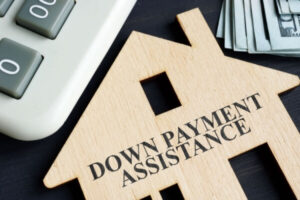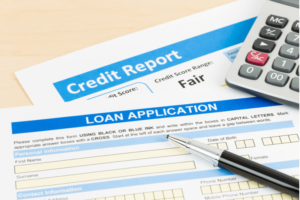A first-time homebuyer is an individual who is buying a home for the first time or has not owned and occupied their primary residence for three years prior to purchasing a new home.. Lenders and government agencies typically use this designation to provide specific benefits or assistance to those new to the homebuying process.
Whether they seek financial assistance, educational resources, or support services, first-time homebuyers often have access to specialized programs and benefits designed to help them own a home.
Down Payment Assistance Programs
Down payment assistance programs are designed to help individuals or families who can’t afford a down payment on a home. These programs vary widely in terms of eligibility criteria, funding sources, and the amount of assistance provided, but they typically work in the following ways:
- Eligibility Requirements: Each program sets its eligibility criteria, including income level, credit score, occupation, location, and whether the buyer qualifies as a first-time homebuyer. It is important to note that if you haven’t owned a home in three years, you are eligible for first-time homebuyer programs.
- Application Process: Potential homebuyers must apply for the program and provide documentation to prove their eligibility. This may include proof of income, tax returns, bank statements, and other financial information.
- Assistance Types: Down payment assistance programs can take various forms, including grants, loans, or deferred payment loans. Grants do not need to be repaid, while loans may have repayment terms, depending on the program. Deferred payment loans often do not require monthly payments, but repayment is typically due when the home is sold, refinanced, or no longer used as the buyer’s primary residence.
- Amount of Assistance: Some programs may cover the entire down payment amount, while others may only cover a portion. The assistance amount may also be based on income and the home’s purchase price.
- Homebuyer Education: Many down payment assistance programs require participants to complete a homebuyer education course. These courses typically cover topics such as budgeting, mortgage basics, maintenance, and the responsibilities of homeownership.
- Restrictions and Requirements: There may be restrictions on the type of home that can be purchased using down payment assistance funds, such as a maximum purchase price or requirements related to the home’s condition. Additionally, participants may be required to live in the home as their primary residence for a certain period.
- Repayment: Depending on the assistance provided, participants may be required to repay some or all of the assistance if certain conditions are unmet. For example, if the home is sold within a specific timeframe or used as a rental property, aid repayment may be required.
Overall, down payment assistance programs can be valuable resources for individuals or families who need help overcoming the financial barrier of a down payment to purchase a home. However, it’s important for participants to carefully review the terms and requirements of each program to ensure they understand their obligations and responsibilities.
Government-Backed Loans
Government-backed home loans are mortgage loans insured or guaranteed by a government agency. These loans are designed to make homeownership more accessible to individuals with difficulty qualifying for conventional loans due to low credit scores, limited down payment funds, or a lack of established credit history. One of the most common types of government-backed home loans is the Federal Housing Administration (FHA) loan.
Here’s how FHA loans work:
- Insured by the FHA: These loans are insured by the Federal Housing Administration, a part of the U.S. Department of Housing and Urban Development (HUD). This insurance protects lenders against losses if the borrower defaults on the loan.
- Lower Down Payment Requirements: One of the critical benefits of FHA loans is that they typically require a lower down payment than conventional loans. While conventional loans often require a down payment of at least 5%-20% of the home’s purchase price, FHA loans may require a down payment as low as 3.5%. This makes homeownership more accessible to buyers who have not saved much money for a down payment.
- Credit Score Flexibility: FHA loans may be more lenient when it comes to credit score requirements compared to conventional loans. While conventional loans typically require a minimum credit score of around 620-640, borrowers may qualify for an FHA loan with a credit score as low as 500. However, a higher score may be required to qualify for the lowest down payment option and best interest rate.
- Fixed and Adjustable-Rate Options: FHA loans are available with fixed and adjustable interest rates. Borrowers can choose a fixed-rate loan, where the interest rate remains the same for the entire term, or an adjustable-rate loan, where the interest rate may change periodically based on market conditions.
- Mortgage Insurance Premiums (MIP): Borrowers must pay mortgage insurance premiums (MIP) on FHA loans. Unlike private mortgage insurance (PMI) on conventional loans, which can be canceled once the borrower reaches a certain amount of equity in the home, MIP on FHA loans typically remains for the life of the loan if the down payment is less than 10%, or for 11 years if the down payment is 10% or more.
FHA loans are a popular option for first-time homebuyers who may need help qualifying for conventional home loans due to limited down payment funds or credit challenges. However, it’s essential for borrowers to carefully consider the terms and requirements of FHA loans — including the ongoing cost of mortgage insurance premiums– before deciding if this type of loan is right for them.
Lower Interest Rates
First-time homebuyers may qualify for lower interest rates on their mortgage loans, depending on market conditions, lender policies, and government programs.
Some government-backed loan programs, such as FHA loans, V.A. loans, and USDA loans, offer competitive interest rates to qualified first-time homebuyers. These programs are designed to make homeownership more accessible by providing favorable terms and conditions.
Many lenders offer special promotions or incentives to attract first-time homebuyers. These incentives include lower interest rates, reduced closing costs, or other benefits to make homebuying more affordable for first-time buyers.
It’s important for first-time homebuyers to shop around and compare offers from multiple lenders to ensure they are getting the best possible interest rate on their mortgage loan. Additionally, working to improve credit scores, saving for a larger down payment, and taking advantage of government programs and incentives will help first-time buyers secure more favorable terms and conditions on their home loans.
Closing Cost Assistance
Several programs exist to assist homebuyers with closing costs, which are expenses beyond the home’s purchase price. These costs typically include fees for services such as appraisal, title insurance, legal fees, and loan origination fees. Here are some ways programs can help with closing costs:
- Seller Concessions: In some cases, home sellers may agree to contribute to the buyer’s closing costs as part of the purchase agreement. This is known as a seller concession or seller assist. The number of seller concessions allowed can vary depending on the type of loan and the lender’s guidelines.
- Employer Assistance Programs: Some employers offer homebuying assistance programs as an employee benefit. These programs may include down payment and closing cost assistance, homebuyer education, or other resources to help employees purchase a home.
- Nonprofit Organizations: Certain nonprofit organizations provide financial assistance to homebuyers, including help with closing costs. These organizations may target specific groups, such as low-income families, veterans, or first-time homebuyers.
Each program may have different eligibility criteria, funding limitations, and requirements, so it’s essential to understand the terms and conditions before applying. Working with a knowledgeable real estate agent or loan officer can also help homebuyers identify and access relevant programs for closing cost assistance.
Tax Deductions
While both mortgage credit and deductions provide financial benefits to homeowners related to their mortgage payments, they operate differently regarding how they affect tax liability. A mortgage credit directly reduces taxes owed, while a deduction reduces taxable income, indirectly lowering the tax bill.
First-time homebuyers may be eligible for various tax deductions to help reduce the financial burden of purchasing and owning a home. While tax laws can vary and change over time, here are some standard deductions that first-time homebuyers may be able to take advantage of:
- Mortgage Interest Deduction: This deduction allows homeowners to deduct the interest paid on their mortgage loan up to $750,000 for a single homeowner. For married couples filing separately, the deduction is limited to $375,000. For most homeowners, mortgage interest is the highest deductible expense. First-time homebuyers can deduct the interest paid on their mortgage loan, including any points paid to lower the interest rate, as long as their primary residence secures the loan.
- Property Tax Deduction: Homeowners can deduct property taxes paid to state and local governments from their federal income taxes. This deduction can provide significant savings, especially in areas with high property tax rates.
- Mortgage Insurance Premium Deduction: A deduction may be available for homeowners who pay for private mortgage insurance (PMI) or mortgage insurance premiums (MIP) on FHA loans. This deduction allows homeowners to deduct the cost of mortgage insurance premiums as mortgage interest, subject to certain income limitations.
- Home Office Deduction: If part of your home is used regularly and exclusively for business purposes, you can deduct expenses related to that portion of your home, including mortgage interest, property taxes, utilities, and home maintenance costs.
- Energy Efficiency Upgrades: Homeowners who make energy-efficient improvements to their home, such as installing solar panels or energy-efficient windows, may qualify for tax credits or deductions.
First-time homebuyers should consult with a tax professional or accountant to ensure they take advantage of all available deductions and credits. Tax laws can be complex, and eligibility for deductions may vary depending on individual circumstances and changes in tax regulations.
Grants and Subsidies
Grants and subsidies for first-time homebuyers are financial assistance programs designed to help individuals or families overcome the financial barriers to purchasing a home. These programs can come from various sources, including government agencies, nonprofit organizations, and private entities. Here are some common types of grants and subsidies available for first-time homebuyers:
- USDA Rural Development Loans: The U.S. Department of Agriculture (USDA) offers loans with low or no down payment options for homebuyers purchasing properties in eligible rural areas. These loans are designed to promote homeownership in rural communities and may include subsidies to help reduce mortgage interest rates.
- Good Neighbor Next Door Program: This program, administered by the U.S. Department of Housing and Urban Development (HUD), offers eligible teachers, law enforcement officers, firefighters, and emergency medical technicians a 50% discount on the list price of a home in designated revitalization areas. Participants must commit to living in the home as their primary residence for a specified period.
- State and Local Grants and Programs: Many state and local governments offer grants, subsidies, and other assistance programs for first-time homebuyers. These programs may include financial assistance for down payments, closing costs, or mortgage interest rate subsidies. Eligibility criteria and program details vary by location.
Educational Resources
First-time homebuyers can access a variety of educational resources and counseling services to help them navigate the complex process of purchasing a home. These resources provide information, guidance, and support to ensure homebuyers are well-informed and prepared for homeownership.
- Homebuyer Education Courses: Many nonprofit organizations, government agencies, and community groups offer homebuyer education courses. These courses cover a wide range of topics related to the homebuying process, including budgeting, credit management, mortgage financing, finding the right home, and homeownership responsibilities.
- Housing Counseling Agencies: HUD-approved housing counseling agencies provide personalized counseling and guidance to prospective homebuyers. Certified housing counselors can help individuals understand their options, navigate the homebuying process, evaluate mortgage options, and address any barriers or challenges.
- Financial Literacy Workshops: Financial literacy workshops focus on building financial skills and knowledge to help individuals make informed decisions about homeownership. These workshops cover budgeting, saving, credit management, debt management, and long-term financial planning.
- Government Programs and Resources: Government agencies such as HUD, the Consumer Financial Protection Bureau (CFPB), and state housing finance agencies offer a wealth of information and resources for first-time homebuyers. These agencies provide educational materials, online guides, toolkits, and interactive resources to help individuals understand their rights, responsibilities, and options when buying a home.
Conclusion
The key advantages to owning a home include tax benefits, equity building, the potential for appreciation, pride of ownership, and increased flexibility and freedom. These advantages make homeownership a rewarding and attainable goal for individuals and families seeking to establish roots and build wealth for the future.
Several financial assistance programs are available to facilitate the homebuying process. Start by exploring local programs in your area and consider contacting a professional real estate agent to help establish a personalized buying approach.
HUD-Approved Online Homebuyer Education Course
HomeTrek is an easy-to-use HUD-approved online homebuyer education course. Our course will help you learn budgeting, saving, how to improve your credit, understand home much home you can afford.
Down Payment Assistance Programs in California
Down Payment Assistance Programs in Pennsylvania
Down Payment Assistance Programs in New York
What Is the Minimum Down Payment for First-Time Home Buyers?
First-Time Home Buyer Guide
First-Time Homebuyer Tax Credit
First-Time Homebuyer Requirements
Down Payment Assistance Programs in Texas
Credit Scores and the First-Time Homebuyer
First-Time Home Buyers: Programs & Qualifications
Sources:
- N.A. (ND). Home Economics. Retrieved from https://www.hud.gov/sites/documents/HOMEECONOMICS-EN.PDF
- N.A. (ND) Know Before You Owe | Mortgages. Retrieved from https://www.consumerfinance.gov/know-before-you-owe/
- N.A. (ND) Buying a Home. Retrieved from https://www.hud.gov/topics/buying_a_home
- N.A. (ND) Home Buying Assistance. Retrieved from https://www.usa.gov/buying-home-programs
- Kolomatsky, M. (2023, September 7) Buying Is Just the Beginning. What Does It Really Cost to Own a Home? Retrieved from https://www.nytimes.com/2023/09/07/realestate/buying-is-just-the-beginning-what-does-it-really-cost-to-own-a-home.html










